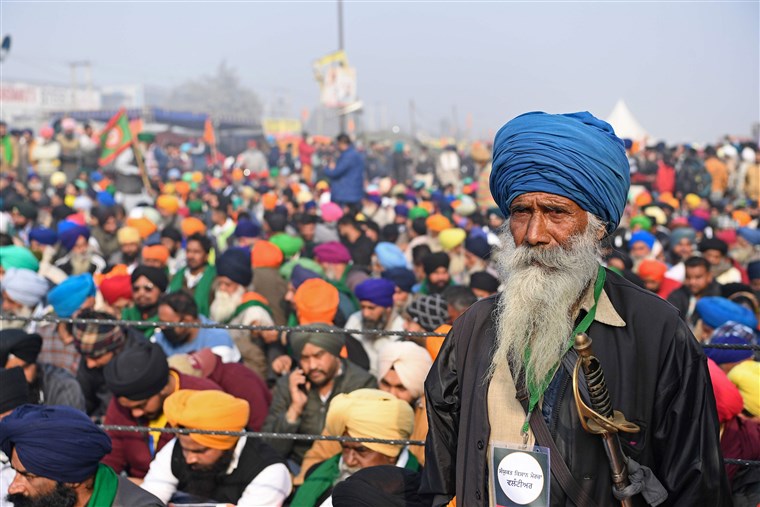(Leon Wolf) India’s farmers in revolt
Related Hundreds of Protestors Prevent Vote on New Covid Restrictions from Moving Forward in Boise, Idaho
by Leon Wolf, December 9th, 2020
Although most of the world outside of Asia remains oblivious, it is possible that the largest protests in human history are occurring right now in India, as an almost innumerable mass of farmers has risen up in protest against reform measures intended to improve the country’s flailing agricultural economy.
What are the farmers protesting?
For years, the Indian government has provided guaranteed minimum prices to Indian farmers, and also kept in place a series of laws that has prevented consolidation of farmland into larger tracts. The system was designed to protect small farmers and provide them with reliable, stable income. The average farm in India is less than three acres.
As you might have guessed, however, the system has caused India to fall catastrophically far behind the rest of the globe in farming efficiency. And additionally, while the system has provided a basic subsistence living to many farmers, it has effectively kept them trapped in poverty. According to some estimates, over half of India’s workforce currently works on farms, but farms only account for less than one-sixth of India’s economy.
By way of comparison, the entire agricultural and food sector in America employs about 10% of its population and represents about 5% of its economy.
The system is, by any measure, not making any money for anyone, and also isn’t doing a great job of providing food. In ordinary times, the sheer weight of the number of people working on farms provides enough food for India, but because the Indian agricultural system is so dependent on human labor, it is especially sensitive to disruptions in the labor market, which is one reason why India’s food supply has been disproportionately affected by the COVID-19 pandemic, relative to other countries.
The government has responded with a series of reforms, some of which are merely proposals at this point, and others of which were rammed through into law using parliamentary tactics that have even been criticized by the reforms’ proponents. The government wants to allow private buyers to purchase the products produced by Indian farmers, instead of requiring farmers to sell to the government. They also want to relax laws regarding consolidation of agricultural land.
The farmers believe that these reforms — which are widely considered by economists to be necessary to the modernization of India’s entire economy — will end up driving them off of their family farms, which they believe will be consolidated and eaten up by large farming corporations.
How large are the protests?
Huge.
The protests began in August and have grown in both intensity and size since. Reliable estimates of crowd sizes are difficult to come by because of the sheer number of people involved. According to one estimate, during Tuesday’s protest alone, protesters jammed shoulder-to-shoulder clogging over 19 miles of major highways in Delhi, suggesting that at least tens if not hundreds of thousands were present.
Some estimates have suggested that the number of people who have protested nationwide in India since the protests began has been over 200 million, which would certainly place it in the running for the largest protest in human history.
India’s farmers announced a general strike on Nov. 26, which involved more than 250 million farmers, thus making it almost certainly the largest organized strike in history.
The strike and accompanying protests — which have included farmers burning their fields and a heavy-handed government response that has caused scattered violence — has brought the country to its knees.
Prime Minister Narendra Modi’s government is now negotiating with the heads of farmer unions to see if a compromise is possible that will get India’s farmers back to work. Thus far, farmers have rejected those proposals and have promised that unless the reforms are repealed, they will escalate their protests and continue to bring life in India to a halt.
Save 10% and get free shipping with a subscription!Fight viruses, remove heavy metals and microplastics, and restore your gut all at once with
Humic and Fulvic Acid from Ascent Nutrition.
MUST HAVE DETOX POWERHOUSE!
About The Author
Leon Wolf is Managing Editor for TheBlaze. Previously, he worked as Managing Editor for RedState, as an in-house compliance attorney for several Super PACs, as a white collar criminal defense attorney, and in communications for several Republican campaigns. You can reach him at [email protected].
Stillness in the Storm Editor: Why did we post this?
The news is important to all people because it is where we come to know new things about the world, which leads to the development of more life goals that lead to life wisdom. The news also serves as a social connection tool, as we tend to relate to those who know about and believe the things we do. With the power of an open truth-seeking mind in hand, the individual can grow wise and the collective can prosper.
– Justin
Not sure how to make sense of this? Want to learn how to discern like a pro? Read this essential guide to discernment, analysis of claims, and understanding the truth in a world of deception: 4 Key Steps of Discernment – Advanced Truth-Seeking Tools.
Stillness in the Storm Editor’s note: Did you find a spelling error or grammatical mistake? Send an email to [email protected], with the error and suggested correction, along with the headline and url. Do you think this article needs an update? Or do you just have some feedback? Send us an email at [email protected]. Thank you for reading.
Source:
https://www.theblaze.com/news/massive-india-farmer-protests


Leave a Reply